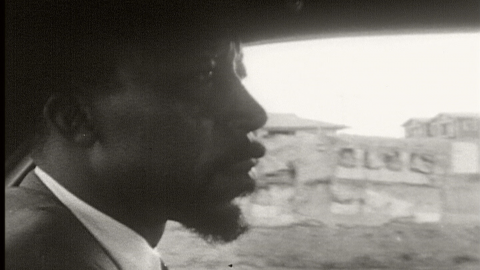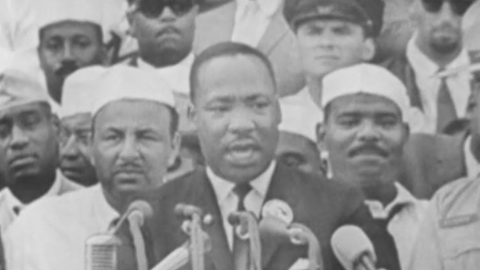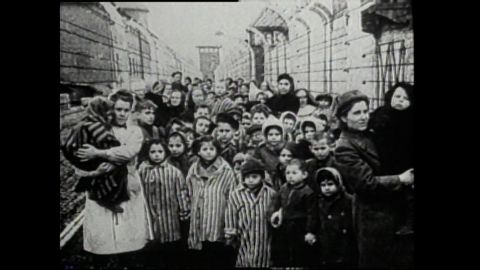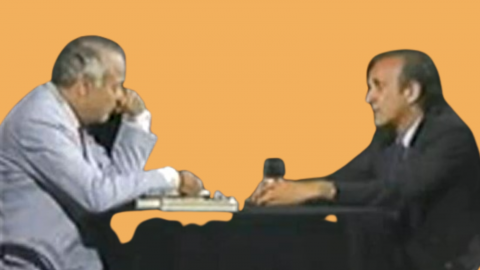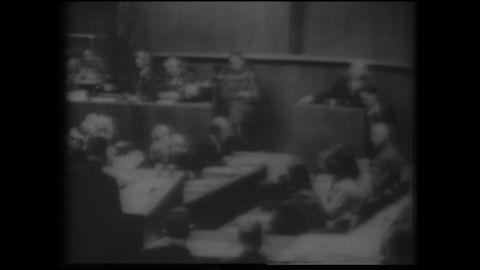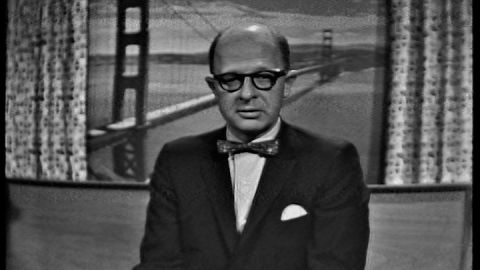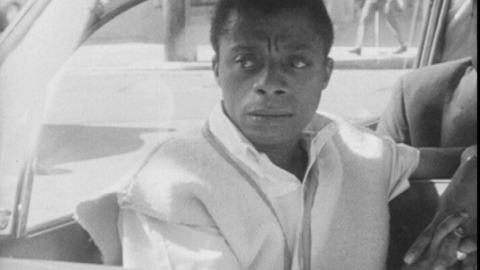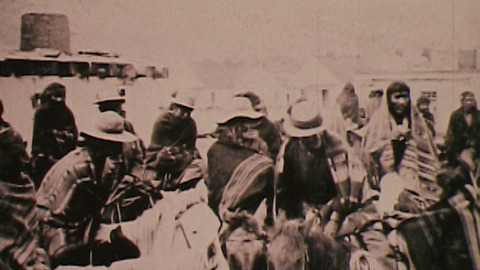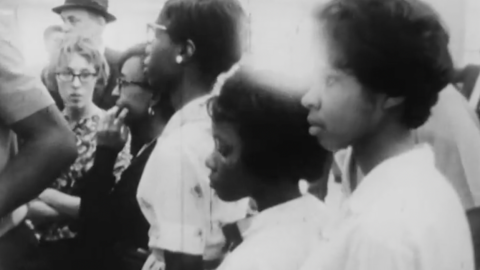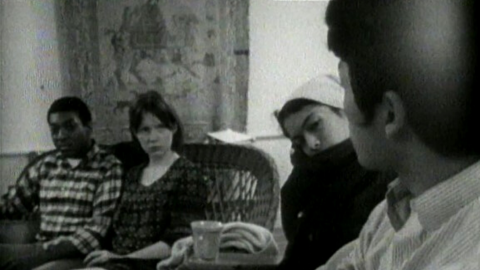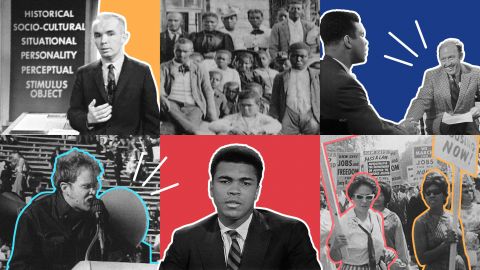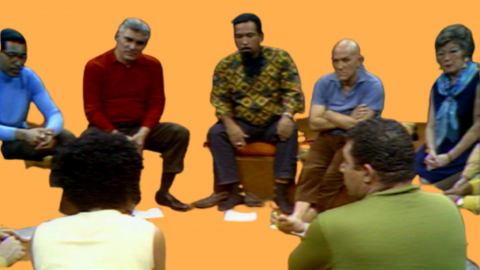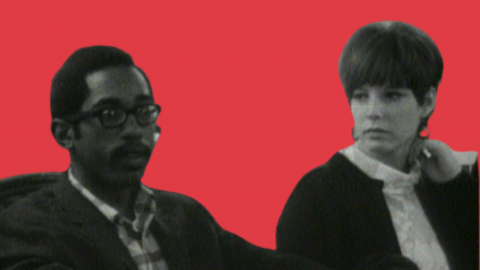- It's going to wind up as a white man
against the colored man.
And thank God we still have the majority.
- We will not be coerced into hiring any colored person,
regardless of his qualifications, as a matter of direst
or as a matter of expedience.
- It just that when somebody says, "Do you want 25% in
by, say, the 15th or 17th of September?"
You can't push people.
- I think there's nothing wrong
with a school that's 100% Negro.
- When the Negro can prove to the white man
that he can live like the white man,
then we will accept 'em.
- The only thing that scares me
is the neighborhood will end up getting bad.
- And if we ever wanted to sell, naturally,
your house depreciates and the colored get in.
- If they move in, the next step we have to accept
is intermarriage.
- We can be sociable with them in work.
We can get along with them and joke with them.
But when we leave our job and close the door,
and then we're on our way home,
we want them to go in their direction
and we can go in ours.
[protesters chanting]
- [Protesters] Jim Crow! Must go!
Bob Wagner! Must go!
Rockefeller! Must go!
- [George Page] National Educational Television presents
"Confronted", a report on white Americans in the north
who are personally confronted with the Negro in revolt.
Your reporter is George Page.
- [Protesters] Jim Crow! Must go! Jim Crow! Must go!
- Throughout the north, the white American is confronted
with Negro Americans, demanding freedom now.
As you will see, he's confronted in Chicago, in St. Louis,
in Folcroft near Philadelphia,
and in the New York suburb of Malverne.
And the white man is confronted here in New York City's
borough of Queens.
This is the construction site
of a huge $96 million apartment complex,
and the continuing demonstration
against alleged discrimination by a construction union.
The unions deny discrimination.
The Negroes say of 2000 workers on the project,
only 150 are Negro.
- [Protestors] [chanting] Must go!
- A lilly white union, must go!
- Jim Crow, must go!
- Jim Crow, must go!
- Jim Crow, must go!
- We all want the same thing, here.
- And the managed that they have caused is, um,
there's a continuing struggle
against construction unions, you know?
- Truthfully, they want more freedom, I guess, you know,
more advantages like that,
but they shouldn't show it in this way, I don't think.
It makes them look stupid.
Just the waste of time, I think.
Because instead of people thinking they're equal,
or people startin' to like 'em,
I think more people hate them and stuff like that.
They think they're acting like animals.
[chanting]
- [Protesters] Oh ho, what do ya know?
Jim Crow must go!
Oh ho, what do ya know?
Jim Crow must go!
Oh ho, what do ya know?
Jim Crow must go!
Oh ho, what do ya know?
- I'm just wondering whether
it's a case of wearing out your welcome.
We'll be out here until the snow falls.
We're going to stay here until something gives.
Something has to give some where.
- I only got a few more years to live,
and I want everybody else to live and let live,
up in the mountains and hibernate.
[George laughs]
- [George] Would you mind one way or the other?
- Neither way.
- [George] Neither way.
- Neither way. I don't care.
- [George] What do you think
about the demonstration down there?
- I think they're nuts.
[chanting]
- Jim Crow, must go!
- Lilly white union, must go!
- Lilly white union, must go!
- Lilly white union, must go!
- Lilly white union, must go!
- Lilly white union, must go!
[protesters continue chanting]
- Actually they want to be president, every one of 'em,
and they don't want to work their way up,
they want to start at the top, a lot of 'em.
- Took years for us to get the conditions we have today,
and then you have somebody to come over there and say,
just push you on the side and say,
"Well, we want to take your place.
You just get the hell out."
- [Man] Everybody has a right to work,
but I'm looking to get out of the trade myself, you know.
Not that glamorous a business, and it's a lot of hard work
and it's not so easy, but they got a right to live.
They can come on in.
- If they come in the way we all came in,
through the Apprentice [indistinct] Program,
then I believe it's all right.
- [George] Do you think this kind of demonstration
is effective?
- No. I think the leaders are taking advantage of 'em.
- [George] Where are you from?
- Louisiana.
- [George] What do you think about it?
- That's enough said, isn't it?
- [George] Is it?
- I'm from Louisiana. I don't care to comment anymore.
- [George] Okay, thank you.
- Thank you.
[chanting continues]
- [Protesters] Lilly white union, must go!
Lilly white union, must go!
- We got cars here from North Carolina,
South Carolina, Texas, Mississippi, Alabama,
just stand here while they come through.
You have out-of-state workers in this place
where a Negro can't get a job.
- What the woman can do here?
A woman can do hard work? A woman can't do hard work.
- I'll tell you one thing,
as far as the picketing is concerned,
they seem to be able to,
they are getting a few, little results.
- They say we've been holding 'em down a long time,
but, gee whiz, I never even though about it.
You know, like who had time to worry about them?
I was struggling myself.
You know, it's been a tough for our side, too,
but it's hard work. It's not so easy.
I don't think the average guy feels that,
you know, he wants to hold them down or anything like...
I'm Local 28, cheap metal workers,
I don't think the fellows in my union are prejudice.
I don't think anybody is really prejudice.
- [George] You think the demonstrations are a good way
for them to get into the union?
- Well it's the only way. We picket, too.
I mean, we picket when we want something.
So it's only fair that they should picket.
Of course, lying in front of a truck, uh,
I think they did that back in the 30s,
so I really can't say too much about it.
You know, we had our trouble, too, in Flint, Michigan.
But, you know, everybody gets hot under the collar.
If I come to you and say, "I want your job",
you're going to get a little annoyed, too, in other words.
But, they just want a percentage.
They want to work like anybody else.
I hold nothing against them.
I feel more for the fellas. I'd feel the same way.
We're a different stock today.
We're not from the old school way.
You know, "Hooray for me and the heck with you."
We're more or less, "Come on, give everybody
an equal chance."
You know, I feel that way, my wife feels that way.
I'm raising my kid that way.
Well, I got to go home.
♪ We shall not, we shall not be moved ♪
♪ We shall not, we shall not be moved ♪
♪ Just like a tree that's planted by the water ♪
♪ We shall not be moved ♪
♪ We shall not, we shall not be moved ♪
♪ We shall not, we shall not be moved ♪
♪ Just like a tree that's planted by the water ♪
♪ We shall not be moved ♪
[protesters continue singing]
- [George] The train from Manhattan
to Malverne Long Island, a typical commuter train town.
Eleven thousand prosperous suburbanites live here,
including a fast-growing number of Negroes.
Until recently, none of Malverne's whites
would have thought a controversy involving race
was possible in their town.
And then, a new term, de facto segregation,
took on real meaning in Malverne.
- [Al] I think that the Negroes in the north,
have been more often wrong than right.
And I think the Negroes in the south have rarely been wrong.
- [George] Al Hirshman is a retired Malverne businessman.
A controversial order came down from the state school
commissioner and Hirshman spearheaded a movement to
fight it in the courts and with pressure.
The order, a plan must be adopted to end racial imbalance
in the town's three elementary schools.
One school is 80% Negro. The remaining two, 80% white.
Most of Malverne's Negroes live in a pleasant section
called Lakeview.
- [Al] There are no Negroes living
in the Malverne or the Lynbrook parts
of the school district.
When you, by choice, live in a community
which is largely Negro or largely white,
when you, by your own choice, do that,
even though the choice is dictated with pressure
such as difficulty and moving into another community.
Still, it's by choice. There's no harm done.
We're now going to go to Lakeview.
- [George] But all the children
in the district come to the junior and senior highs.
- Is that right? - Yes.
- [George] All of them?
- [Al] Yeah.
- [George] And in Lakeview, the population is
primarily Negro, is that correct?
- [Al] No, 50% Negro.
- [George] But the population of the school,
the Lakeview school, is 80% Negro.
- [Al] It will be this year.
And then almost all of these newer homes
were taken up by Negro residence.
Some of them have Cadillacs in front of them,
the middle class.
And, incidentally, it's mostly these newer residents,
and the well-to-do people in them,
who are causing the difficulty here.
They came here to reform the place.
The facts do remain that Negroes' children
do not perform as well in schools as white children.
Now you can ascribe whatever reason if you want,
but they're arguable.
But the statement I just made is not arguable,
because it's a matter of fact.
The strength of the Negro race does not lie
in the field of academic achievement as a group.
Again, making this generalization,
which doesn't apply to individuals.
And, uh...
- [George] Where then is it's strength?
- In fields of emotion and arts,
and music and think-...
- If you lose the suit,
if you lose the court case, what will happen?
- Then I think Malverne School District 12
will become a totally Negro community.
- [George] Why?
- Because I think the whites will get out
and the Negroes will come in.
If the conduct of the Negroes of the north
foreshadows what the Negroes of the South will want
after they get an easy break,
then I say it's too bad for the country.
[applause]
- [George] Hirshman is called the father
of the Taxpayers and Parents Association,
T-A-P called TAP.
TAP obtained a court order stopping the state
commissioner's plan from going into effect.
And a group went to Albany
to picket the commissioner's house.
- We all went up to Albany. We picketed Albany.
And I want to say one very interesting fact came
out of this trip.
Since that time we've found
that there are a lot of housewives in this community,
who would rather picket than do housework.
[audience laughing]
And we've had a real problem
keeping them holed in the homes.
- [George] This group proposed the TAP Freedom Plan,
which would allow any parent, Negro or white,
to send his child to either
of Malverne's three grammar schools.
- Each and every individual should have the right to decide,
for themselves, which of the three elementary schools
they feel is the most desirable
for their children to attend.
And they, and only they,
should be able to make this decision.
[applause]
- [Man] The only thing I'm saying is,
I'm more interested in seeing what is to be offered
as a solution to the problem.
- I do mind the traveling.
- [Man] What did you have against the traveling?
- The traveling? I don't drive.
I have three little children.
- No matter which way the decision goes,
it is still going to leave the same problem.
The decision is not going to be acceptable
to one or another.
- I feel...
- Just a minute. - Yes.
- Let me finish.
- Some people who are in favor of the Princeton Plan
have made it known that it's-
that it would be three quarters of a mile away,
but that isn't so because we've clocked it
directly from our door to the school,
and it's a mile and three quarters.
- [George] Under the Princeton Plan,
all Malverne children of a particular age group,
both Negro and white, would be assigned to one school.
One school building would be reserved for first,
second and third graders only.
Its sponsors say the Princeton Plan would prevent
any one school from being more than 50% Negro.
- But they would actually have to go double the distance
to that school if the Princeton Plan went through.
- [George] They said your children, in particular,
would have to stay there?
- Yes. My fourth grader would have to go.
Because they would have fourth and fifth graders in there.
And every three years, kindergarten, first, second
and third would be in this school.
Fourth and fifth would be in this school.
Sixth, seventh and eighth would be in this school
and high school was here.
So they would have to go to four different schools.
In, uh, in that time, you know, during their school career.
And I think that that's too many times to change.
That they will have to go so far away
just to balance the races.
And I don't think that's good for them.
That's another reason I don't like the Princeton Plan.
- [Man] If this plan were put into effect
for the reasons that they want to put it into effect,
this would definitely take away everybody's rights
in this one small area, as far as education goes.
And, then, the next step is going to be
telling people where they can live, housing,
so on and so forth.
It's got to come to that because
if the State Education Department is going to
try to control racial balance in the schools
by destroying the neighborhood schools.
And if people all move out of the neighborhood,
and, let's say, it becomes an all-white neighborhood
and [indistinct] becomes an all-Negro neighborhood,
what are they going to do then,
merge school districts?
And then the next step when the people move again,
if people move again and change the neighborhoods again,
and then the next step is going to be to tell you,
"Well, you can't move anymore.
You have to stay there or you'll upset the racial balance."
- The real problem is the hysteria on the part of parents,
you know, who, I think, one, are really disappointed
because, the kids, they like them to be nearby.
But, then, two, I think because there are a lot of feelings
that go below the surface that maybe a lot of people
aren't willing to recognize in themselves.
- [George] Rabbi Samuel Chiel thinks something
should be done to balance the races in Malverne's schools.
- But I think it might be possible
to get both sides together.
We're currently working on this.
Now you see, it seems to me that in the north,
nobody's against integration.
Everybody's for integration.
But, not now, not here, maybe, you know,
in the next town, next century, but not here.
And so it seems to me that this is really a part
of a strategy.
The strategy is that you just can't say,
"We're segregationist",
because only Governor Wallace can say that, you know.
But this can't be said in the north.
Everybody's for integration.
And I don't really think that they're bigots,
but I think we all have a lot of problems and prejudice
that we're not willing to face.
One can attempt to defer the solution to this problem
by simply saying, "It's a housing situation,
it's a sociological problem. It's not a school problem."
But that's not facing the issue.
In Malverne, it happens to be focusing on the schools.
This is the place to start working on it.
It's gotta be broken somewhere.
You just can't choose the place that you're
going to start solving this problem.
- [George] The Jefferson Bank, St. Louis, Missouri,
Executive Vice President, Joe McConnell, is confronted.
- On the afternoon of August the 28th, 1963,
which was the deadline set by the CORE organization
for our hiring four Negroes,
two of the representatives of CORE called at our bank
and asked what we had intended to do.
And I told them at that time
that our position was clearly stated,
that we would continue to follow a policy
of non-discrimination and hiring of all of our employees
on a qualification basis, if a need existed.
And they said, "Then you're not going to hire four people
by today."
And we definitely said we would not do that.
They said, "Well, then, if we would call off
this demonstration, would you, on a preferential basis,
hire four Negroes within the next six months?"
And I explained then that that is exactly
what they were preaching against.
That would be discrimination against the white employee.
And we would certainly not agree to that.
[protesters singing]
♪ We want freedom ♪
♪ We want freedom ♪
[Protester] Right now!
- [George] The Congress of Racial Equality says the bank's
practice contradicts its policy.
CORE says it's been seven years
since Jefferson Bank hired a Negro,
and points out there are 80 white and two Negro employees.
[protesters singing and chanting]
- [Al] They picketed for an hour
and then they blocked our doors
and then they entered our bank, singing, chanting,
clapping and obstructing our business.
We were absolutely unable to do any business at the time,
in spite of our statements to them
that we would continue a non-discriminatory hiring policy.
[protesters singing and chanting]
- One of our most trusted employees,
a colored boy, who's been with us close on to 15 years,
started as a paper boy on the corner of
Jefferson and Franklin Avenue.
We put him to work as a porter then as a bank messenger,
and finally, five or six years ago,
as a statement teller.
- [Al] Dave?
Dave, I want you to meet Mr. Page.
[George] Hello, how are you?
- Nice to meet you Mr. Page.
- I've been telling Mr Page
that you've been with us, for what, 15 years or 13 now?
- Thirteen. 13 years.
- Have they been pleasant here, Dave?
- Very pleasant.
- Well, that's what I was telling Mr. Page.
And I was also telling him how you felt
about the demonstration here at the bank.
- Yes, sir.
- How do you feel?
- Well, I think they made a stupid move.
I think they were wrong in the way they came in.
You don't demand anything, you ask people
and negotiate with them.
That's the way I feel about it.
And I think if they had came in and, in the right manner,
and through due process,
they would be given every consideration.
But they didn't come that way.
They came in with demands.
- That's right. And they came in and told us
how many we had to hire by a given day.
- That's right.
And that's what we were presented.
- That's right.
Regardless of what our needs were,
regardless of what their qualifications were, just...
I was telling Mr. Page I'd just love to have
more people like you in this bank.
And, maybe, as a result of the publicity, given this thing,
I'll be able to accomplish that some day.
- Well, I hope so Mr. McConnell.
- Oh, I hope so, too, Dave.
- Thank you. - Thank you.
- [George] Glad to have met you.
- Likewise, sir.
- We'd just love to have more people of his integrity
employed by our bank.
We don't think of him as a colored man.
We think of him as one of our people
and all of the people in the bank feel the same way.
And that's why we've been so desirous
of having qualified Negroes applying here.
We know that they have ability
if they have had the proper training.
We know that they're entitled to equal opportunity.
We don't think they're entitled to preferential treatment.
Certainly we're not uh...
That would be discriminatory in itself
to give preferential treatment to any group,
as distinguished from another group.
Our position is clear. We intend to follow it.
We don't think we're the first bank picked out,
but we're the first bank in St. Louis who stood up
for the rights granted all of us, whether
we're bankers or garage men, to run our own businesses
on a basis of opportunity, qualification and need.
That is our position.
And we will continue to follow that position,
regardless of threats of intimidation
and coercion, and everything else that's been applied.
- [George] Negro jazz trumpeter, Dizzy Gillespie,
staged a one-man sit-in at this barbershop
in Chicago's Loop.
He sat for six hours without service.
Got his haircut the next day after a man
from the Human Relations Commission called on the owner.
- What about the problem of
Negroes who come into your body barbershop
or go to any barbershop?
What's the main problem with that?
- Well, that's the problem.
That, uh, a lot of us don't know how to cut their hair.
It's very hard, because we're not used
to cutting that type of hair.
As I was saying, when I went to a barber college,
we used to have about 17, 18 barbers there,
and then the three colored barbers.
And every time a colored man come in line
they would give to them.
So, and, therefore, we had no opportunity
to cut those people's hair.
Their hair is strictly all by clipper
and I can't use clippers.
- [George] What happened when Gillespie came in here?
- Well, I didn't know how to cut his hair.
He had taken an awful chance
in getting a haircut off of me.
Not only that, but if a colored man comes in
and get a haircut by us,
it hurts all these colored barbershops.
They got a lot of good barbershops in the city of Chicago.
I mean, real good. Better, better class than mine.
- Was Gillespie the first colored man who had ever come in?
- Yes.
- Did you know who he was?
- No idea. I didn't.
- What do you think of a public accommodation bill,
a law that would insist that you had to do this,
that you had to cut anybody's hair regardless of their race?
- Well, I would get...
Let's see, in the situation, I wouldn't allow to cut it.
I think I would quit [indistinct].
- You mean, you'd get out of business?
- That's right.
[protesters chanting]
- [Protesters] Ain't you ashamed,
[indistinct] won't you please get lost.
- [George] Four thousand whites march
on Chicago's City Hall, opposing an open occupancy bill
under consideration by the city council.
The marchers want a statewide referendum on the question,
but the bill passes anyway and makes it illegal
for real estate brokers to discriminate
in the sale or rental of housing.
The March was organized by Howard Scaman,
the 31 year old Chairman
of the Property Owners Coordinating Committee.
The committee is made up of representatives
from neighborhood organizations throughout Chicago.
- [Person On Phone] I can't see how they can pass something
like this when the state voted against it.
- Well they won't be able to after we get through with them.
- [Person On Phone] Well, gee, that's a relief.
- Okay, sir. [chuckles]
- [Person On Phone] It's good to know
that somebody's still fighting for the white people.
They're stepping all over us.
I have to work with them downtown.
- [George] Scaman is becoming a familiar public figure
in Chicago.
There's even talk of running him for Congress.
- [Person On Phone] Within a week, right?
- Within a week. Yes, sir.
- [Person On Phone] All right, I'll get a few circulating,
I'll get 'em signed. That's plenty of time.
All the employees that I talk with, white ones I mean,
they're against it.
But what they say to me is, "What can we do about it?
Nobody's doing anything about it."
- We're getting something done now. [chuckles]
- [Person On Phone] That's what I like to hear. Okay.
- Okay, sir. - Thank you so much.
Thank you for calling. Goodbye now.
- [Person On Phone] Bye.
[coughs]
- Parking lot up for the apartment buildings
and the owner's on the other side here.
- [George] Scaman says he's against open occupancy laws
on constitutional grounds.
But he frankly admits, no Negroes are wanted
in South Lawndale.
- Well, why, basically though,
do these people not want the Negroes to come in?
- Well it's not a fear of Negroes, per se
it's a definite fear of anyone
who would run down their neighborhood.
Home is probably the most important thing
to people of this basic ethnic background.
These are primarily Bohemian-Polish people.
People have a great deal of pride in their homes.
All you have to do is look at uh...
What we're coming up to here ahead of us is,
while it's not typical of the community,
it's certainly not the exception to the rule.
Here's a man who has a parking lot.
Check that over there. [chuckles]
There's a group of the boys
who are off work this afternoon.
[speaking in foreign language]
- [Howard] Mr. Churney?
[speaking foreign language]
- We have uh...
These gentlemen are up from Boston
and they're here filming a report in Chicago.
Basically, they're trying to understand
why we don't want colored people to move
into this neighborhood.
- Yeah.
- Uh, how do you feel about it?
- Oh sure. I don't want them here either.
They're unclean and you know what they do all the time.
We don't want uh...
As long as we can hold it, so we hold it without 'em.
They passed that law that you
have to take colored people, huh?
- It's not passed yet.
- But uh...
- We're still fighting them.
- That won't do 'em any good anyway,
because if colored people come,
then I can't say higher $50 for the place.
Then he wouldn't take it.
- [Howard] So the law doesn't need...
- The law don't stop us.
That's why people don't put no more rates for rent.
They could've put it...
Yeah, if colored people come,
they can say it's gone
because he got the ticket in the window.
But, he gives you $150, and what they gonna do,
take the car and walk away?
- [Howard] Mm-hm.
[laughing]
- [Man] They go to arresters out here,
and nobody bothers him.
- Yeah.
- Why is that?
But I don't believe that they should
have a right to...
- No, sure. As long as we can keep it, so we keep it.
- [Man] So that, rent it to who you please,
and not to what they tell you to rent it.
- Yeah. Yeah.
- Well good. Thank you very, very much, gentlemen.
Appreciate it a lot.
- [Man] You're welcome.
- [Mr. Churney] All right.
- I'll be back for the daily news update
in just a few weeks.
- [Mr. Churney] Okay, all right.
Thank you, thank you.
[men speaking foreign language]
- Now let's go and take a look at the adjacent neighborhood.
- All right, then.
[kids talking and shouting]
- [Howard] This is what our community
doesn't want to happen.
- Well, you can go almost anywhere and find
run down neighborhoods like this one.
But why would it be necessarily true
that a neighborhood would be run down
just because Negroes moved in?
- Oh no. This isn't true at all.
You take our Chapin section here, which is one
of the very finest residential areas in the city.
Almost exclusively Negro. And maintained.
Pretty kept up.
It's a very, very desirable community to live in.
My point is these are our immediate neighbors here.
And this is why you find so much resistance,
not only in their community,
but in all these immediate marginal areas
to this community and others such as Woodlawn.
- [George] In other words, your people feel that this is
what would happened to their neighborhood.
- This is what would happen to their neighborhood, right.
- You feel that way, too?
- I know it.
If you think on the northwest side
of the city of Chicago, that you are going to be living
in an all-white community, then definitely, you're mistaken.
You are, eventually, going to live in, either,
an integrated or inundated community.
I really envy you out here in the northwest side
of the city of Chicago, because you are
very, very far removed from the real problems that exist.
You don't have slums within a block or two of you.
But if open occupancy bills are passed
in the city of Chicago, it will directly affect you.
We feel that, if this bill is permitted to be enforced,
it will cause a mass exodus of the people who can afford
to move from Chicago into the suburbs
where they think they're protected.
We feel that Chicago will become a mecca
for all, let's face it, Negro immigrants from all over
the entire country.
It's very easy to get on the relief rolls here.
There are reasons for opposing open occupancy legislation
on constitutional grounds.
There is no one or no legislative body,
or no government, which has the right
to tell you who you should sell or rent your property to.
The Supreme Court has not ruled on it,
and they refuse to do so.
It might be nice if we had a Supreme Court of our own
for a change.
- Well how do you feel about the clergy of Chicago...
- [Man] Ooh. [laughing]
[laughing]
- Well, I mean, telling us that it's, more or less,
our moral obligation to accept integration
and stop fighting it.
- They all take the same moral position that social justice
and equality for all people is the right thing to do.
I believe in this, I support it and I'm sure you do.
But anytime the Catholic Church
or whatever faith they belong to tells me
I'm supposed to vote for bill number so-and-so,
I'm going to tell him just where to go.
- Why do they want to go into a white neighborhood?
- [Howard] They don't.
- I mean, The city of Chicago builds them beautiful housing.
- [Howard] Have you ever been in...
- No, I haven't been, but, before they occupy,
they are beautiful.
- No. It's going to come eventually.
I'd say in 200 years we're all going to be one race.
- [Woman] One race.
- And, after all, the white people are a majority,
not a minority. This we know.
- I mean, I wouldn't say whether I was or I,
I am or against, or for something of this sort.
- I'm not, like you said, I'm not against any colored
that's uh...
They have a right to education.
But, as far as our rights, we should have the right
to sell to whoever we want.
- [George] Would you want to live next door to a Negro?
- No.
- [George] The Chicago Real Estate Board
is fully backing Scaman's fight,
and published a leaflet called Forced Housing.
The board's president is Percy E. Wagner.
Well, in general, how do you feel
about any legislation aimed at the broker
that has the objective of open occupancy?
- We think that it is illegal, that they have no,
no right to enact a law
which has to do with the human rights
and the property rights of individuals.
And that it's a violation
of both the 13th and the 14th amendment,
the Constitution and the Illinois Constitution.
You purchased a property because you desire to live
in a certain place.
And you have, therefore, also, the right to sell
and to rent.
That's a fundamental human right
as well as a property right.
And you take that away from a person, you are taking away
from him, his constitutional rights.
I don't ask people to my house, in my home,
on my property, that are not acceptable to me.
Neither does anyone else.
Many white men, I wouldn't have step across my threshold.
All right? Would you? Do you allow everybody to come
in your house? That's all there is to it.
Do Negroes come into my house?
Do-do-do Chinese come into my house?
Do I entertain them in my house? Yes.
At my choosing, see.
The same as they accept me in their home.
Don't forget, that in Chicago,
the International Real Estate Federation
had a convention here in June,
in which we had 348 members
of the Real Estate Federation of all races,
all creed, joined together in [indistinct].
And next year, we're going to Israel, see.
The solution to a problem of this type
lies in education, education in both races,
both, in the white race and the Negro race.
Whether, over the course of time,
there will be integration to the point
of acceptance of all peoples by each other,
is something that I don't believe any man could foretell.
People don't accept each other, per se.
You have your own friends.
You have your own people that you choose to live with.
We might even say that amongst our relatives,
we don't get along well together.
So to expect that, by law,
you can make like a social change of this type
is pretty farseeing and far-reaching.
- [George] There are 1500 row houses in Delmar Village,
a seven year old housing development
in Folcroft, Pennsylvania.
Homes for this Philadelphia suburb sell for
ten to eleven thousand dollars.
And the people of Folcroft call them their dream houses.
Most of Folcroft's residents
work in the technical labor field.
They make between $4500 and $8500 a year.
They are proud of their community.
Until recently, it was all white.
Then, Horace Baker, his wife and little girl moved in.
[people shouting]
[camera clicks]
- [Policeman] Hey, hey, excuse me. Hey, hey, hey, hey!
[people shouting]
- [Rioters] You nigger!
You nigger!
Niggers!
Niggers!
Niggers!
[people continue shouting]
- [Woman Rioter] We want freedom!
[people screaming]
[glass breaking]
[crowd cheering]
- [Crowd] Boo! Boo!
[crowd shouting]
- [Crowd] Boo!
[crowd shouting]
- [Policeman] Stop it.
- It sort of just seems like a nightmare
because you feel as though you were only trying to move
into a home in which you purchased
and, that you weren't trying, in any way, to interfere
with anyone else's life or their property,
but yet you were...
And...
[baby crying in background]
- They could have moved in 6:00 in the morning
and just got in there without anybody seeing them,
but they waited until 5:00 at night.
Early in the morning, they could have just snuck in there.
Why didn't they do that?
- The newspapers,
the TV, the radio,
they gave a false conception of what happened
in Delmar Village.
Tonight at 7:05 on WIBG,
they had a program called "World In Perspective",
which was called "Disgrace of Delmar Village."
Now the people in this village
and the people of Folcroft do not feel
that this is right.
The newspapers, the television, and a radio
have not seen our side of it.
- I think they're gettin' paid to move in.
- Huh?
- I think they're gettin' paid to move in this area.
- Any colored that moves into this area,
I'm sure is only coming here for one reason,
that's to bust the neighborhood down,
discourage the white person,
stop the whites from moving into the area
and hope that it will be converted
into a Negro, integrated development.
- Besides it being forced integration
it's forced legislation.
- Well, what I can't understand is
that this is supposed to be a free country
and great nation and whatnot,
and, yet, to hear them say,
"Oh, I'm afraid. I won't say anything. I'll lose my job."
- That's right. And look, I work, I work with...
- This is no free country.
- I work with 400 colored people,
and out of them 400 people, I mean, a lot of 'em
have felt the same way I did.
They thought they had a lot of guts moving out here.
- Sure. I've heard lots of different colored people
themselves say the same thing,
that it wasn't right.
They...
Now what...
Something's wrong somewhere.
Free country and, therefore, everybody's afraid
to open their mouth, afraid they'll lose their jobs.
- Well, they're afraid of the pressure of the NAACP
because they exert the pressure on the employer,
but the employer is afraid to buck them and say,
"Well, I'll keep the man on."
They take the easy way out.
The same as the big food stores,
the government, everybody else.
They don't want to buck the tide there, so to speak.
- But the only thing that really scares me is
if the colored did move in next door,
and my little girl grew up
with the little boy next door and she liked him.
I mean, like, yeah, I don't understand the intermarriage,
that's one thing that I don't like it all.
And that's what I would be afraid of
because she grew up next door to him
and she liked him and...
I know the majority
usually don't marry the boy next door,
that doesn't usually happen.
But, if they grew up together
and went to school together
and, I think, if they were mixed,
I think that that will be the next thing,
that there would be a lot of that in a marriage.
I don't, I don't...
That I don't see. Uh-uh.
That's the only thing...
But as far as them as people,
they're the same as me, I don't lower them in any way.
There probably are a lot more of them
that are better than me.
That's-That's the thing that bothers me,
intermarriage, I don't like that.
- Well, I can't see why that this colored family,
Negro family, moved down Delmar Village,
where, within four blocks away,
they're building a new housing development,
and they're still building it,
that they couldn't move down there.
And I can't see them moving down to Delmar Village,
where houses are anywhere between five and 10 years old,
and try to move in somethin' old,
and yet they can move in a new house.
What are they trying to prove?
- A lot of people in this world
think that the Negro, I say n-
has a place in this world.
He does have a place in this world.
The Negro does not want
equality, he wants preference.
- Who was it, President Kennedy says
in his inauguration address, "Ask not what your country
can do for you, but ask what you can do for your country."
What has the Negro race done for their country since 1960?
- [Woman] I don't know, but we've done a lot.
- We have done an awful lot.
[woman laughs]
- They're pushing too hard.
They're pushing the white people to hard,
and something's gotta be done.
I don't know what, but we're not...
Maybe you have to start writing a block vote.
- [George] The newly appointed Block Captains
of Delmar Village meet.
Their purpose: to keep the people of the village
informed and freeze out The Bakers.
No white in Folcroft has spoken out
in defense of The Bakers.
The Block Captains say they speak for all of Folcroft's
white residents.
- Anything that's done here violently in Folcroft
is against the federal government.
That's why our mayor had to go with the federal government.
And I think everybody in this town understands that,
that these people have the right to come into Folcroft
and live like first-class citizens.
But, to me, and I think to 90% of the white people,
they haven't proved themselves.
For instance, the Italian people,
when they came to this country, I understand,
they had Little Italy.
The Germans, they had their town.
And they proved one thing to each other,
that they could live with each other.
- Unfortunately, these people came out here
and gave, to everybody, the impression
that they were being pushed in by an outside organization.
Although it's been denied.
[group talking]
- I believe you brought up a point though.
When you purchased your house,
how many times did you look at it?
- [Man 1] Like 10 or 12 times. More than that.
- [Man 2] Every week.
- Now, I believe The Bakers, and I'll say The Bakers,
looked at their house only once.
I found out that they visited their home once.
Now, if it was such a dream house I'm sure,
before the settlement time came around,
they would have been inspecting the house more than, uh,
like five or six times.
At least, me, I bought the house before it was even built.
- Well, I'd a slept in that house,
if it was such a dream house, before they put the roof on.
- That's right.
- Well, Jack, it's another point that I'd like to bring up.
For instance, when these television men,
white television men, interview these colored people,
I would just like, once, just once,
for this colored man to ask this man where he lives.
"Where do you live? Do you live with colored people?
Or do you have a nice home, three acres of ground
with a house right in the middle?
And you're one of these saying integrate."
And that's what's burning everybody up.
I mean, with these row homes,
you're living next door to each other.
And, I mean, contact everyday.
- [Man] And you're share a common walk, common steps.
You have nothing but, perhaps, six inches of masonry
between you and your neighbors.
If they get a little loud, you're aware of it.
There's no doubt about this.
Everybody has to be more concerned with their neighbors
than we would otherwise.
- The whole truth in a nutshell,
the 90% of the whites that live in Folcroft
have ran away from the colored people.
They have...
I ran away from the colored people. I will not deny this.
My wife, when I lived in Philadelphia,
I had, uh, my family would try to go to the store.
My wife, for instance, would try to go
to the store eight o'clock at night.
She couldn't make it.
It was because that 80% of the colored people
had moved into West Philadelphia, and I had to run.
I have to protect my family.
I can't, I...
It's no sense. I tried.
I had a colored fella living next door to me.
An ace! This man was better than any white man
that I know. He was an ace.
And he told me-I hate to use this word "nigger"-
but he told me that "Nigger riffraff is moving in, Eric.
And I'm going to move out.
I have to move out of this town myself."
And for instance, right down here,
we have a beautiful colored gentlemen. Beautiful.
These people come to our stores.
I work with colored people that are wonderful.
I think they're, I think they're great,
I mean the people working for me.
But I can't see them living on my doorstep
because they have proved nothing to me.
- Let's take The Baker family, for example.
He moved into our area on the 29th day of August.
This man...
It was advertised on WIP in Philadelphia.
This man went to Florida. His wife returned to work.
This is the same damn kind of responsibility,
irresponsibility that we're talking about.
His wife was working. He was in Florida.
Where was the daughter?
The daughter has been in Sellersville, Pennsylvania
with the mother-in-law.
Now, this is the same kind of thing
that we're talking about, irresponsibility.
My children are home.
My children haven't been farmed out
since I have been married. Have yours?
This is a normal deal.
A girl integrated a university.
What'd she do? She married a white fellow from Boston,
or from Massachusetts, her father thought it was a disgrace.
Why did he think it was a disgrace?
This man possibly could have been paying lip service
to integration.
Now, it's just this simple.
Now we've had two good ministers that have donated money
to these people.
Who else has donated money?
Every taxpayer in the United States of America
has donated money to these people. For what?
Why does the American person try to buy his conscience,
with a dollar?
- They just don't want to face it, Joe.
The white people just don't want to face this thing,
and they're just backing down
on everything that the NAAC-
- Well, I don't think they don't want to face it.
I think that every white man would like to do their share,
but they're afraid.
Now, this NAACP is a n-...
- [Man] National movement.
- Not that, it's a powerful organization.
And we've had men from this village fired
from their jobs because their pictures were in a paper.
What kind of rights does the white man have
when this has to happen?
They're all afraid to move.
- It gets back to what I said, again.
This is a organized minority group that's taking charge
of an unorganized majority group.
They vote in a block, which is what we have to do.
We have to vote in a block.
We always fight when our backs are against the wall.
This is the same with a lot of animals,
which we're all animals.
- [Man] But, Joe...
- [Joe] But some of us are cannibals.
- But, we can't fight, Joe,
because this is one country.
I mean, this is what the communist party wants.
They're gonna destroy us within.
And I'll tell you, Joe, we can't say "fight."
I mean, we've got to-
- [Joe] I'm not saying fighting. I'm talking about
fighting our legislation.
- Yeah, fighting our legislation,
because this is one country, Joe.
- [Man] I agree.
- And, we've got to get this thing ironed out
amongst ourselves.
We need no other country to iron this thing out.
This has got to be ironed out by our politicians
and straight through.
I mean, level, no, no backbiting and...
Level this thing out to the people,
tell this NAACP what's going to happen.
Come out, truthfully, and tell what 90% of the white people
want them to know, Joe.
Because the colored man [indistinct],
we smile, we laugh, but look what happened here in Folcroft.
The other side of the face was turned.
His face was slapped.
It could have been the same man that you work with,
or I work with. It could have been true.
I mean, we have to level this thing,
and we don't want to live with it.
And that's all there is to it.
[man speaking over police radio]
- [George] The Pennsylvania State Police
still guarding the Baker's house on Heather Road.
- This is the type of a feeling, and I felt that,
in the home that we would purchase,
in whatever neighborhood,
we would earn the neighborhood's respect.
This is what I do.
And, sort of my philosophy in life is
in earning people's respect,
and being just treated as an individual,
and not trying to be stereotyped
with any type of a group or race or creed.
And, won't, would say, I feel as though,
as far as pigmentation, that's about the only difference
that we majorly have.
I don't feel as though, I'd say,
with the education that you receive,
there shouldn't be any other differences.
Every summer, I see the Caucasians,
they try to go and get themselves tanned
and try to match you up with that.
So, I really, I don't feel as though there should be
that many differences or...
It's such a cruel type of a feeling.
- [George] How do you think this is going to
affect your child?
- She wasn't here during the first week that we were here.
And, I'd say, as far as the type of a feeling
that's going on, I don't feel as though, directly,
she would be aware. Maybe in a year or so she would.
But, right now, I don't feel, unless someone actually
told her, she knows no prejudice at all.
She'll say hello to anyone.
- [George] Has she said hello to any of the residents
in Folcroft?
- I'm sure she has.
She went out, outside, I guess it was the same day
that she came here, and, the neighbors next door,
they put up a wrought iron rail at the top,
but they put it off, just enough off, uh, centered it,
It meant, sort of, to be that we weren't supposed
to touch it.
And so, of course, she not knowing this, she went down
and touched it and some neighbor hollered,
"Get that baby's hand off the rail."
And, that was that. I just told her not to touch it,
but I'm sure she'll touch it again
until we put up a railing beside it
so that she doesn't come in contact with that one.
But, this is what I mean, children actually don't
know this type of a thing.
It has to be instilled upon 'em.
- In New York, Chicago, St. Louis
and in suburban Folcroft, Pennsylvania,
we've seen how some white Americans in the north responded
when confronted with Negro Americans demanding freedom now.
We've seen white opposition increase
as the Negro came closer and closer,
until, in Folcroft, Pennsylvania, the strongest fears,
integrated housing and intermarriage, erupted into violence.
When a lack of understanding and emotion take over
as they did in Folcroft,
how are these real feelings to be dealt with?
Perhaps the rioting on that Folcroft street
could have been avoided if some organization,
apart from the civil rights groups,
had helped the people of Folcroft overcome their fears.
The major civil rights groups have sought mainly
to desegregate, to open doors to Negroes
that, once, were only open to whites.
As those doors began to open,
the hope was that new contacts between Negroes and whites
would mean improved white attitudes.
And, in many cases, new contacts have helped the white man
look at the Negro man in a new and kinder light.
There are places where real integration
is proceeding peacefully.
But as long as there are whites who respond with bitterness
and, even violence, the white man's emotions
can not be ignored.
Following a summer of growing white resistance in the north,
Dr. Martin Luther King, Jr. has recognized this.
Talking about the Northern white, he said recently,
"We can never have meaningful integration
until these prejudices are recognized and discarded.
Obviously, a major effort by both races is needed
to see that these prejudices are recognized and discarded.
The American Negro is now making an unprecedented effort
to gain his freedom, and the respect of whites.
The American white is going to have to make an equal effort
to prepare for the day when he is confronted."
Most white Americans have not yet been confronted,
confronted by the Negro who will not go away.
The schools, churches, the government agencies,
the communications media all have a responsibility
to help the white man accept his new relationship
with his fellow Negro citizen.
But, ultimately, whether or not the white man receives
the help he needs, it will be the truly personal decisions
that count.
And, so, every white American now needs to ask himself,
"What will my answer be, when I am confronted?"
This is NET, National Educational Television.

